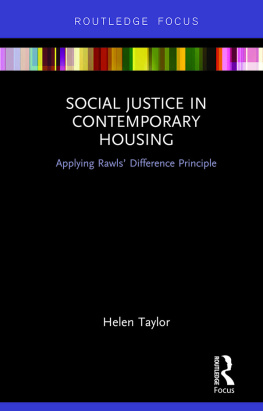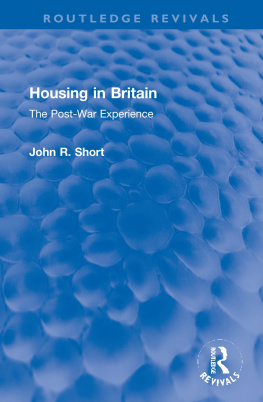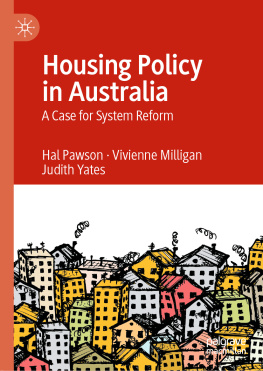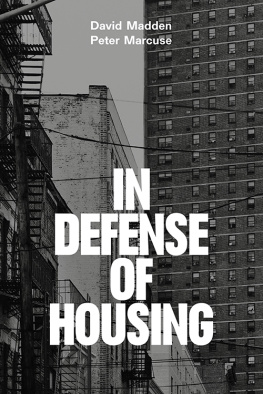Contents
Guide
Pagebreaks of the print version
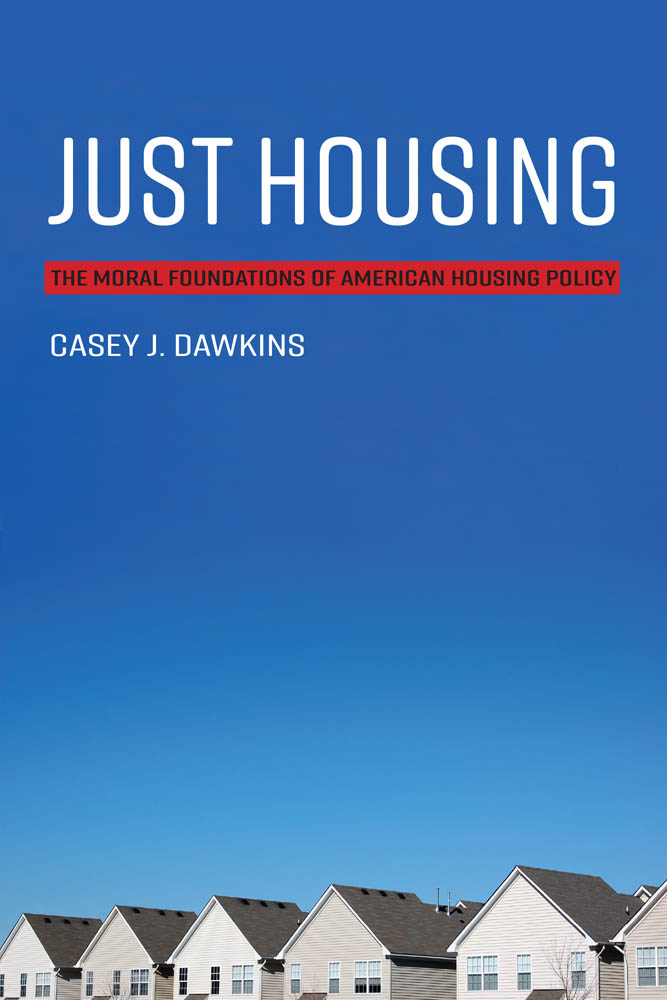
Urban and Industrial Environments
Series editor: Robert Gottlieb, Henry R. Luce Professor of Urban and Environmental Policy, Occidental College
For a complete list of books published in this series, please see the .
Just Housing
The Moral Foundations of American Housing Policy
Casey J. Dawkins
The MIT Press
Cambridge, Massachusetts
London, England
2021 Massachusetts Institute of Technology
This work is subject to a Creative Commons CC-BY-NC-ND license.
Subject to such license, all rights are reserved.

The open access edition of this book was made possible by generous funding from the MIT Libraries.
The MIT Press would like to thank the anonymous peer reviewers who provided comments on drafts of this book. The generous work of academic experts is essential for establishing the authority and quality of our publications. We acknowledge with gratitude the contributions of these otherwise uncredited readers.
Library of Congress Cataloging-in-Publication Data
Names: Dawkins, Casey J., author.
Title: Just housing : the moral foundations of American housing policy / Casey J. Dawkins.
Description: Cambridge, Massachusetts : The MIT Press, 2021. | Series: Urban and industrial environments | Includes bibliographical references and index.
Identifiers: LCCN 2020053009 | ISBN 9780262543071 (paperback)
Subjects: LCSH: Housing policyUnited States. | HousingMoral and ethical aspectsUnited States.
Classification: LCC HD7293 .D33 2021 | DDC 174/.936355610973dc23
LC record available at https://lccn.loc.gov/2020053009
d_r0
publication supported by a grant from
The Community Foundation for Greater New Haven
as part of the Urban Haven Project
I dedicate this book to Mom and Dad, who made our house a home, and Erin, who gave my heart a home.
Contents
Preface
As I began to proofread the final draft of this book, the world changed. In March 2020, the COVID-19 pandemic forced everyone into their homes. The housing justice community mobilized for action on behalf of those without homes and those facing housing insecurity. Several local, state, and federal government agencies in the United States responded with policies that granted temporary relief from rental and mortgage payment obligations. In May 2020, George Floyds brutal death at the hands of the Minneapolis police catalyzed a nationwide reckoning with the durable legacies of Americas racist past and present. These events, combined with the disproportionate burden of COVID-19 borne by people of color, brought attention to structural injustices that are deeply embedded within Americas institutions. A variety of proposals for reform that were only in their embryonic stages in summer 2020 will likely come into full view by the time this book hits the shelves. I hope that this book offers lasting advice to US housing policymakers seeking to incorporate the lessons from 2020 into policy reforms that will chart a path toward justice. As this book goes to press, these lessons have only begun to be revealed.
Acknowledgments
Most of my previous work dwelled in the realm of empirical housing and land-use policy evaluation. This book is a departure from that. The idea for the book originally came from my work in the fair housing arena, where advocates are currently engaged in a spirited debate about the scope of the Fair Housing Acts mandate to affirmatively further fair housing (Fair Housing Act of 1968, 808). I quickly learned that this debate was one among many that could not be resolved with additional empirical data on the consequences of policy alternatives. The most interesting debates to me are those that boil down to disagreements over the moral foundations of housing policy that test the limits of consequentialist reasoning.
This book is my attempt to bring clarity to these debates. It would not have been possible without the support and encouragement of friends, family, and a large community of scholars. I am particularly grateful to my friends and family, without whom it would not have been possible to write a book about homes special meaning and significance. In addition to providing emotional support throughout the writing process, Erin Riley gave several constructive editorial suggestions. Kyle Dawkins offered valuable artistic advice on the books cover. I am also indebted to my academic home, the University of Maryland School of Architecture, Planning, and Preservation (MAPP + D). I offer a special thanks to our current dean, Don Linebaugh, and former deans, David Cronrath and Sonia Hirt, for providing the resources and support to bring this book to completion. Gerrit Knaap and the National Center for Smart Growth were instrumental in helping me secure funding to support the development of several of the books ideas.
This book is the culmination of numerous spirited conversations about the moral foundations of housing and land-use policy. These conversations have included too many scholars and advocates to list, but my doctoral advisor and coauthor, Chris Nelson, deserves special recognition for his support and encouragement over the years. My ideas have also been shaped by many conversations and engagements with the ideas of Andrew Aurand, Michael Bader, Howie Baum, Ariel Bierbaum, David Bieri, Raphael Bostic, Karen Chapple, Michael Elliott, Lance Freeman, George Galster, Ed Goetz, Andrew Greenlee, Sonia Hirt, Derek Hyra, Keith Ihlanfeldt, David Imbroscio, Dan Immergluck, Seema Iyer, Larry Keating, Gerrit Knaap, Ted Koebel, Rob Lang, Willow Lung-Amam, Brian McCabe, Kirk McClure, Myron Orfield, Kurt Paulsen, Rolf Pendall, Jessie Richardson, Bill Rohe, Barbara Samuels, Tom Sanchez, Ben Scafidi, Jenny Schuetz, Lisa Schweitzer, and Ron Sundstrom. I owe a special debt of gratitude to my students, who added the right amount of seasoning to the uncooked versions of the ideas expressed in this book. Others, too numerous to mention, have shaped my ideas through their written work. Their influence can be found in the books citations. I thank the MIT Press editors and anonymous reviewers for numerous suggestions that greatly improved the book. I also owe a debt of gratitude to Laurie Prendergast, who prepared the index. The words on these pages are my own, but countless conversations about housing policy and justice have given the words meaning. This book is derived in part from material previously published in the following journal articles:
- Dawkins, Casey J. 2017. Autonomy and Housing Policy. Housing, Theory and Society 34 (4): 420438. Published online January 8, 2017. Copyright IBF, The Institute for Housing and Urban Research, available online at https://doi.org/10.1080/14036096.2016.1274679 .
- Dawkins, Casey J. 2017. Putting Equality in Place: The Normative Foundations of Geographic Equality of Opportunity. Housing Policy Debate 27 (6): 897912. Copyright Virginia Polytechnic Institute and State University, Metropolitan Institute, available online at https://doi.org/10.1080/10511482.2016.1205646 .
- Dawkins, Casey. 2018. Toward Common Ground in the U.S. Fair Housing Debate. Journal of Urban Affairs 40 (4): 475493. Published May 19, 2018, Copyright Urban Affairs Association ( https://urbanaffairsassociation.org/ ), reprinted by permission of the publisher (Taylor & Francis Ltd, http://www.tandfonline.com ), available online at https://doi.org/10.1080/07352166.2017.1310595 .



